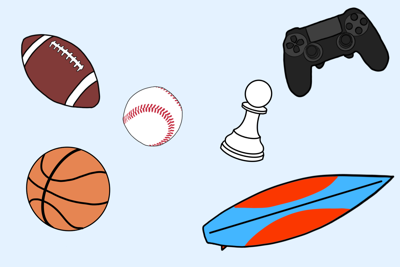
In its most general definition, sports need to fill three requirements: physical exertion or skill, competition between players or teams and a defined set of rules that the competition has to follow.
However, personal interpretations may differ from the standard definition. And with the rise of activities such as eSports, poker and darts on a professional level, the ideals of what defines a sport are beginning to change.
“Anything that involves competition between two or more people or groups of people [is a sport],” says Mark Royce, first-year kinesiology student and member of Western University’s cross-country team. “The competition must require physical exertion and planned, skilled or timed movement requiring thought.”
While these definitions appear to summarize what a sport is, there is vagueness when considering how much physical activity is required.
Well established sports such as archery and golf arguably require very little physical exertion, yet there isn’t much of a polarizing argument on how to classify them. Meanwhile, the debate around eSports and chess has brought on so much controversy.
It certainly isn’t their popularity that has prevented them from reaching their sport status. eSports currently has a viewership of close to 650 million around the world and chess has over 600 million active players, ranking them 8th and 9th place for the world’s most popular sports.
Twitch, a popular online eSports streaming platform, routinely breaks its own records for viewership as its game coverage grows. Chess.com, an online chess platform, garners millions of daily players.
These activities both also require substantial skill and can be physically draining. Studies at Stanford referenced in ESPN have reported that a chess player can burn up to 6,000 calories per day while competing in a tournament. The elevated breathing rates and increased blood pressure can be on par with those of elite athletes in more traditional sports.
“It’s rare to see a top chess or eSports player past [age] 40, similar to other sports athletes,” says James Iansavitchous, first-year science student and director of media of Western’s Chess Club. “That demonstrates the level of physical or mental strength and rigour required to stay competitive.”
eSports also requires dexterity and quick reflexes in competition. Teams such as Liquid, a top professional League of Legends team, practices up to 50 hours per week to hone their skills.
“I would say that eSports have a similar competitive aspect to them that traditional sports do like soccer or football,” says Mustafa Keskin, first-year engineering student and a member of Western’s eSports and Gaming Association.
“eSports also requires split second decisions similar to traditional sports. In a game like League of Legends, there is a lot of variables you must consider while playing and you must effectively communicate with your team and take quick decisions to succeed in the game.”
While many support classifying chess and eSports as sports, there are many arguments against.
“While games such as chess or poker do require a large amount of mental effort, they lack the aspect of a physical skill that can be improved by practising,” says Dylan Comfort, first-year BMOS student and assistant captain of his high school's varsity hockey team “No matter how many times you train moving a chess piece, your skill level will never be improved.”
With channels such as ESPN expanding sports broadcast, the definition of a sport continues to evolve. Although sports purists may argue against this changing definition, the classification of what constitutes sport is determined in the eyes of the beholder.







(0) comments
Welcome to the discussion.
Log In
Post a comment as Guest